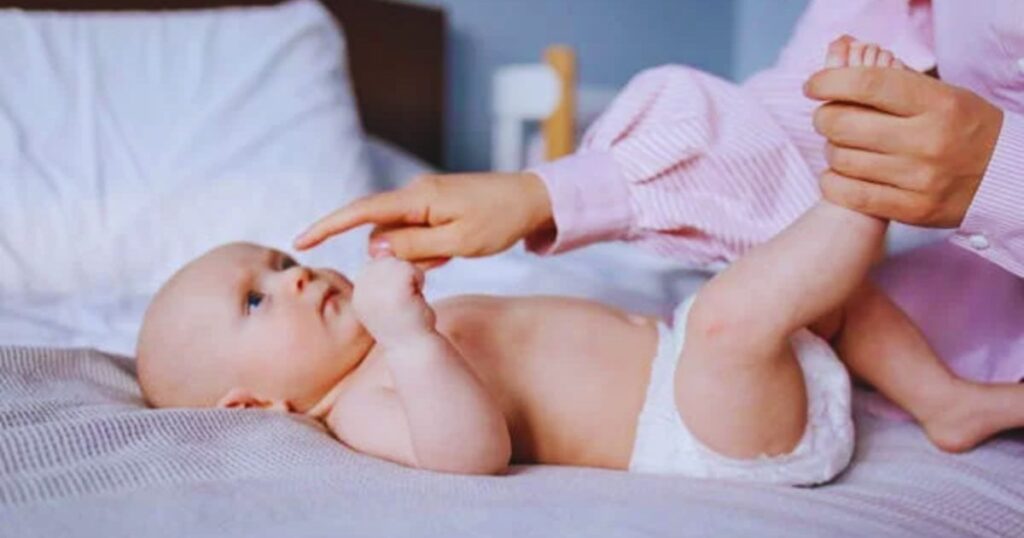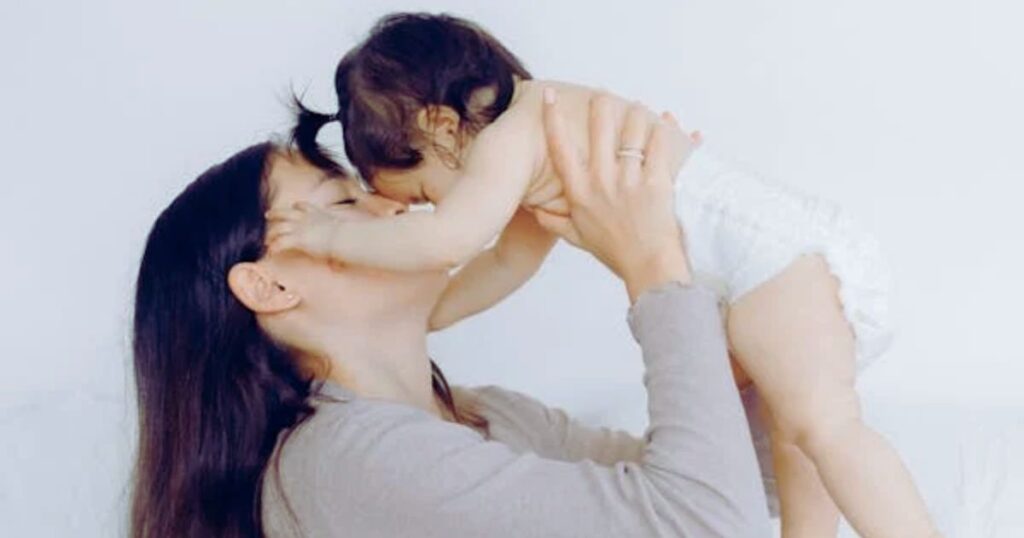How To make your baby diaper free, start with consistent potty training and observe their natural bathroom patterns. Encourage regular bathroom trips and positive reinforcement.
Transitioning your baby to a diaper-free lifestyle requires patience and consistency. Begin by introducing them to the potty at a young age. Notice their cues and bathroom habits to establish a routine. Positive reinforcement, such as praise or small rewards, can motivate them.
Gradually increase the time they spend without a diaper. Accidents will happen, so stay calm and supportive. Over time, your baby will develop confidence and independence in using the potty. Remember, every child is different, so adapt your approach to their unique needs and progress.

Credit: www.goodreads.com
Introduction To Diaper-free Life
Embracing a diaper-free life for your baby can seem daunting. Yet, it offers numerous advantages for both you and your child. Early potty training helps your baby become more aware of their bodily functions. It also reduces the environmental impact of disposable diapers. Transitioning to a diaper-free lifestyle takes time, but the rewards are significant.
Benefits Of Early Potty Training
Early potty training has several benefits that make it worth considering.
- Environmental Impact: Fewer diapers mean less waste in landfills.
- Cost Savings: You spend less money on buying diapers.
- Healthy Skin: Reduces the risk of diaper rash and skin issues.
- Early Independence: Your baby learns self-control and independence early.
Setting Realistic Expectations
Setting realistic expectations is crucial for a smooth transition.
- Time Commitment: Understand that this process requires time and patience.
- Accidents Will Happen: Be prepared for occasional mishaps. It’s part of learning.
- Consistency is Key: Stick to a routine to help your baby adapt faster.
| Expectation | Explanation |
|---|---|
| Time Commitment | Plan for a few months of active training. |
| Accidents | Expect some messes. Keep a positive attitude. |
| Consistency | Follow a daily routine to reinforce learning. |
Signs Of Readiness
Transitioning your baby to a diaper-free lifestyle is a significant milestone. Recognizing the signs of readiness can make this process smoother. Understanding these signs helps ensure that your baby is physically and emotionally prepared. Below are the key indicators to watch for.
Physical Indicators
Physical readiness is crucial for a successful diaper-free transition. Here are some signs:
- Your baby stays dry for at least two hours during the day.
- They have regular bowel movements.
- Your baby can walk and sit down without assistance.
- They show discomfort when their diaper is wet or soiled.
- Your child can pull their pants up and down.
Behavioral Cues
Behavioral cues are equally important in identifying readiness. Pay attention to these signals:
- Your baby shows interest in others using the toilet.
- They express the need to go using words or gestures.
- Your child dislikes wearing diapers and tries to remove them.
- They can follow simple instructions.
- Your baby demonstrates curiosity about bathroom habits.
Recognizing these physical and behavioral signs can lead to a smoother, more successful transition. Stay observant and patient, and you’ll achieve a diaper-free lifestyle in no time.
Choosing The Right Time
Deciding when to make your baby diaper-free is crucial. The right time makes the process smoother and stress-free. This section helps you determine the best time for potty training your baby.
Optimal Age Range
Most babies are ready between 18 to 24 months. Each baby is unique, so observe their readiness signs. Look for these indicators:
- Stays dry for two hours
- Shows interest in using the potty
- Can follow simple instructions
- Dislikes dirty diapers
If your baby shows these signs, it might be the right time.
Seasonal Considerations
Warm weather can be ideal for potty training. Fewer clothes make it easier for your child. Summer allows more outdoor time, which reduces mess indoors. Consider these tips:
- Dress your child in easy-to-remove clothes
- Keep a potty chair nearby, even outside
- Encourage frequent potty breaks
Winter training is possible but requires more patience. Keep your home warm and comfortable. Be prepared for extra laundry.
Essential Potty Training Gear
Potty training is a big step for both parents and babies. Having the right gear can make the process smoother. This section will cover essential potty training gear that will ease the transition. We will look at choosing the right potty and helpful accessories.
Choosing The Right Potty
Picking the right potty is crucial. The potty should be comfortable and safe for your child. Look for these features:
- Size: Make sure the potty fits your child’s size.
- Stability: A stable base prevents tipping over.
- Ease of Cleaning: Choose a potty that is easy to clean.
- Fun Design: Bright colors and fun designs can attract your child.
Below is a table comparing popular potty options:
| Brand | Size | Stability | Ease of Cleaning | Design |
|---|---|---|---|---|
| Potty A | Small | High | Easy | Animal Shapes |
| Potty B | Medium | Medium | Moderate | Cartoon Characters |
| Potty C | Large | High | Very Easy | Plain Colors |
Helpful Accessories
Accessories can make potty training more effective. Consider these helpful items:
- Step Stool: Helps your child reach the potty or sink.
- Training Pants: These are less messy and easier to clean.
- Potty Books: Books can educate and entertain your child.
- Potty Training Chart: Track progress and reward achievements.
- Wipes: Keep wipes handy for quick clean-ups.
These accessories support your child’s journey to being diaper-free. Choose items that suit your needs and make the process enjoyable.
Creating A Routine
Transitioning your baby to a diaper-free life can be exciting and challenging. Creating a routine can make this process smoother for both you and your baby. A structured routine provides predictability, which helps your baby feel more secure.
Establishing Consistent Timing
Consistency is key. Establish regular times for your baby to use the potty. Start with obvious times such as after meals or naps. This helps your baby understand the connection between these events and using the potty.
Track your baby’s natural schedule. Note when they usually wet their diaper. Use this information to set up a consistent potty routine. For example:
| Time | Activity |
|---|---|
| After waking up | Potty time |
| After meals | Potty time |
| Before naps | Potty time |
Incorporating Fun Activities
Make potty time fun. This encourages your baby to look forward to it. Use songs, stories, or toys to keep them engaged while on the potty.
Create a potty-time playlist with your baby’s favorite songs. Sing these songs during potty time to make the experience enjoyable. You can also read a short story while they sit on the potty. This keeps them entertained and relaxed.
Reward your baby for successful potty times. Use a sticker chart to track their progress. Celebrate small victories with a sticker or a happy dance. This positive reinforcement motivates your baby to use the potty more often.

Positive Reinforcement Techniques
Making your baby diaper-free is a huge milestone. Using positive reinforcement techniques can make this journey smoother. Babies respond well to encouragement and rewards. This section focuses on effective ways to keep your baby motivated.
Reward Systems
Rewards can be very motivating for babies. Simple reward systems work best.
- Sticker Charts: Use a chart with stickers. Each successful potty visit earns a sticker.
- Small Treats: Offer small treats like a piece of fruit or a special snack.
- Extra Playtime: Give extra playtime as a reward for staying dry.
Make sure the rewards are immediate. This helps the baby associate the reward with the action.
Encouraging Words
Words of encouragement go a long way. Always use positive language.
- Praise: Say “Great job!” or “You did it!” after a successful potty visit.
- Encouragement: Use phrases like “You’re learning so fast!”
- Affirmation: Tell your baby, “I’m proud of you!”
Consistent positive words build confidence. It makes the baby feel proud and motivated.
Using these positive reinforcement techniques can make the diaper-free transition easier. Keep the focus on positive experiences and rewards. Your baby will soon enjoy being diaper-free!
Handling Accidents Gracefully
Making your baby diaper-free is a significant milestone. Accidents will happen, and how you handle them matters. The key is to stay calm and clean up effectively. This way, your baby learns without stress.
Staying Calm
Stay calm during accidents. Babies sense emotions. If you’re calm, they stay calm. Take a deep breath. Smile and reassure your baby. Accidents are learning opportunities. Your positive reaction teaches them patience and resilience.
Effective Cleanup Tips
Cleanup is crucial. Keep supplies handy like wipes, disinfectant, and clean clothes. Follow these steps:
- Use wipes to clean your baby gently.
- Disinfect the area to prevent germs.
- Change your baby’s clothes if needed.
- Wash hands thoroughly after cleanup.
A clean environment helps your baby feel comfortable. Proper hygiene also prevents infections. Have a designated cleanup area to make the process smooth. Use washable mats to protect floors.
| Supplies | Purpose |
|---|---|
| Wipes | Clean the baby |
| Disinfectant | Sanitize the area |
| Clean Clothes | Change baby |
| Washable Mats | Protect floors |
Praise your baby after cleanup. Positive reinforcement encourages good habits. Remember, this is a learning phase. Patience and consistency are key.
Nighttime Potty Training
Nighttime potty training can be a challenging phase for parents. It involves teaching your baby to stay dry through the night. With the right strategies, you can make this transition smoother.
Preparing For Bedtime
Before bedtime, reduce the intake of fluids. This helps minimize the need to urinate during the night. Create a consistent bedtime routine that includes a final bathroom trip.
Dress your baby in easy-to-remove pajamas. This helps them reach the potty quickly. Ensure their bedroom is safe and well-lit. A nightlight can guide them to the bathroom.
Managing Nighttime Accidents
Expect accidents during the early stages. Keep waterproof mattress covers on hand. These protect the mattress and make cleaning easier.
Place a potty chair near the bed. This offers quick access if your baby wakes up needing to go. Praise your baby when they use the potty successfully. Positive reinforcement boosts their confidence.
If accidents happen, stay calm and supportive. Change the bedding promptly and reassure your baby. Consistency and patience are key to successful nighttime potty training.
Dealing With Setbacks
Transitioning your baby to a diaper-free routine can be challenging. Setbacks are normal and part of the journey. Understanding these challenges and staying patient is crucial. This section provides insights on how to manage setbacks effectively.
Identifying Common Challenges
During the diaper-free transition, you might face a few common challenges. Identifying them early can help you address them better. Here are some typical obstacles:
- Accidents: Expect occasional accidents. Babies are still learning.
- Resistance: Your baby might resist using the potty.
- Regression: A baby may regress after initial success.
- Distractions: Exciting environments can distract your baby.
Understanding these challenges can help you prepare. Stay calm and consistent in your approach.
Staying Patient
Patience is key in the diaper-free journey. Here are some tips to help you stay patient:
- Set Realistic Expectations: Understand that progress takes time.
- Stay Positive: Celebrate small victories. Avoid focusing on failures.
- Consistency: Maintain a routine. Consistency helps your baby adapt.
- Support: Seek support from family and friends. It helps to share experiences.
Remember, every baby is unique. What works for one may not work for another. Keep trying and stay positive.
| Common Challenge | Tip to Overcome |
|---|---|
| Accidents | Stay calm, clean up, and encourage your baby. |
| Resistance | Introduce potty time as a fun activity. |
| Regression | Give extra support and patience during regressions. |
| Distractions | Create a calm potty environment. |
Staying patient and identifying common challenges can make this journey smoother. Embrace the process and enjoy the milestones.

Credit: open.spotify.com
Support And Resources
Starting the journey to make your baby diaper-free can be challenging. Support and resources are crucial to make the process smoother. There are books, guides, and online communities that offer valuable insights. Let’s explore these resources to help you and your baby.
Books And Guides
There are many books and guides available on making your baby diaper-free. They offer step-by-step instructions and practical tips. Here are some top recommendations:
| Book Title | Author | Description |
|---|---|---|
| Diaper-Free Baby | Ingrid Bauer | Learn the art of elimination communication. |
| Go Diaper Free | Andrea Olson | A gentle guide to help your baby go diaper-free. |
Online Communities
Online communities can provide much-needed support and advice. Here are some recommended platforms:
- Facebook Groups: Join groups dedicated to diaper-free parenting.
- Reddit: Participate in the r/diaperfree subreddit for tips and stories.
- Baby Forums: Engage in discussions with other parents on baby forums.
Joining these communities can offer real-time support. You can ask questions, share experiences, and find comfort in knowing you’re not alone.
Frequently Asked Questions
When Should I Start Diaper-free Training?
You can start diaper-free training when your baby shows signs of readiness. This is usually around 18-24 months.
What Are The Benefits Of Going Diaper-free?
Going diaper-free can promote early potty training and reduce diaper rash. It also encourages better hygiene habits.
How Do I Begin Diaper-free Training?
Start by observing your baby’s toilet habits. Introduce a potty chair and encourage regular bathroom visits.
What If My Baby Resists Diaper-free Training?
If your baby resists, stay patient and positive. Try again after a few weeks. Consistency and encouragement are key.
Conclusion
Freeing your baby from diapers is a rewarding journey. Patience and consistency are key. Celebrate small successes and stay positive. Remember, every child is unique. Trust your instincts and enjoy the process. Soon, your baby will achieve this milestone with confidence.
Share your experiences and tips with other parents. Happy parenting!




